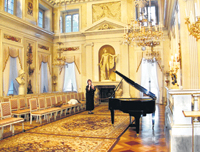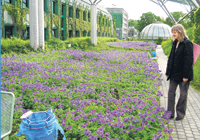|
|
|||||||
|
Polish harmony Feizal Samath samples the jazz, the politics and some Sri Lankan tea in a country fast rising from its communist past Warsaw – Forget the names of Stoczynska, Sawicki or other tongue-twisters like the Lieratka or Pod Lososiem restaurants and replace them with Smith, Brown or the Ritz, and hey presto, the city looks like Paris, London or Rome. Welcome to the land of the greatest composer of all time, Frederic Chopin and Solidarity Leader Lech Walesa, land of trees, castles, rivers, forests, lakes and last but not least, the land of Pope John Paul II. In which capital, is there a forest that sits right in the heart of the city with natural parks and lakes adding beauty to an otherwise bustling metropolis like any other?
It was a week of pure magic for three journalists from Sri Lanka and India during a recent study tour of a country that has shown tremendous progress in the 15 years after it was freed from Soviet domination. Warsaw is a delightful place – filled with beautiful old buildings, clean sidewalks and boulevards, parks, palaces and castles. What a heritage and how organised it has been in preserving the old while bringing in the new!
The guide books are interesting and revealing. “From fine dining to food poisoning,” says one, adding, “Warsaw has a kebab stand on every corner and most of them will do their level best to poison you.” Another on ‘Vice Advice’ states quite categorically that “there are a number of bordellos in the city with ‘sick-looking’ girls from Belarus, while STDs (Sexually Transmitted Diseases) are a fact of life”. Narrow streets of cobblestone ‘vein’ the city, while pigeons in their numbers frequent the city square, with not a crow or a mosquito in sight. The land of thousands of lakes has come a long way, since the Solidarity-led workers’ revolution saw the fall of communism, not only in Poland, but in the whole of Europe. In fact, a sample of the Berlin Wall has been donated to the Solidarity Museum in Gdansk, a shipping town more than 300 miles from Warsaw, where the Solidarity struggle broke the back of the then Communist regime. Lessons galore for Sri Lanka, as we are taken to concerts, parks and museums by professional guides, including an economics graduate, whose second job is ‘guiding’ tourists. His presentation of events and the history of the city of Gdansk, where Walesa launched the now-famous Solidarity movement, is exceptional. Can Sri Lanka match this kind of tourism practised here in a shorter developed period? There was another pleasant surprise for us Sri
Lankans – Dilmah Tea. Sri Lanka’s most famous tea export
has captured a good slice of the Polish market and is a must-have
in the many restaurants, where jazz, tea or Polish vodka go hand-in-hand.
Information flowed from the portals of government, private sector and civil society, as we were told about politics in Poland and the global agenda, relations with other countries, its culture and growing ties with South Asia, particularly India, its affinity towards America due to its support during the pre-communist years, and the economy and foreign investment potential. The media is flourishing with independent and state-run structures. It was thus meetings in the mornings, while some afternoons were left for touring the old cities and towns, historical places of interest, watching buskers (popular street musicians across Europe) in action, and crowds of young people from other cities visiting Warsaw during the summer. “We are not happy that we are in the Middle East as a military force, but we don’t have a choice owing to circumstances (meaning: the need to support the US in most of what it does),” said Deputy Minister Waszczykowski, who believes there is mixed feelings among people about Poland’s involvement in Iraq. Niewiadomska of the Ministry of Culture says Sri Lankans can learn from Polish culture and customs and vice versa. She is keen to host students from Sri Lanka, particularly to study the preservation of historical monuments and conservation, and can offer this expertise even to Sri Lankan society. Poland’s expertise in preserving old buildings and monuments is enormous from what we saw. Another lesson for Sri Lanka would be patriotism. Poland promotes patriotism through schools to educate young people about integration into a greater union – the European Union – while at the same time not forgetting the country’s history, and the sacrifices of many during decades of struggle against foreign rulers. The country is also preparing for a mega event – holding the Miss World Pageant here in September 2006 – which is certain to swell the numbers of the thousands of foreigners, who already visit it every year. At the Tygemont Jazz Club one evening, we enjoy a night of superlative jazz by an American band. The music is good, the atmosphere fun and the food (beer and vodka included) excellent. Corruption is an issue in Poland, like in many countries. Pawel Zalewski, parliamentarian and chairman of the Foreign Affairs Commission discusses the role of MPs, and laments that salaries are low. Only academics are allowed to practise or teach, while doctors and lawyers cannot. He says laws will be introduced soon to set up an anti-corruption office, with one of the exercises being to probe relations between the government and the business sector. “There were lots of these issues in the previous government, where the scale of corruption was high,” he said. Nevertheless, Poland is perceived in the EU and former Soviet bloc countries, as the most successful economy in the region. Poland has a population largely comprising the young, with a major asset – a knowledge of many languages. Most young Poles can speak English, German, French, Spanish, Italian and Russian and are grabbed by other countries, leaving their own with a dearth of manpower. However, workers from ‘poorer’ neighbouring countries come looking for work here. It is literally a land like no other – to borrow a phrase from Sri Lanka. There is no place in Europe other than Poland, where there is so much land and a large working population. This Central and East European nation has 100 cities and some 100,000 workers in each, providing a good human resource. Tourism is a huge money spinner with 64.5 million foreign guests visiting Poland in 2005, which only has 38 million people of its own.
|
|||||||
Copyright © 2006 Wijeya Newspapers
Ltd. All rights reserved. |


